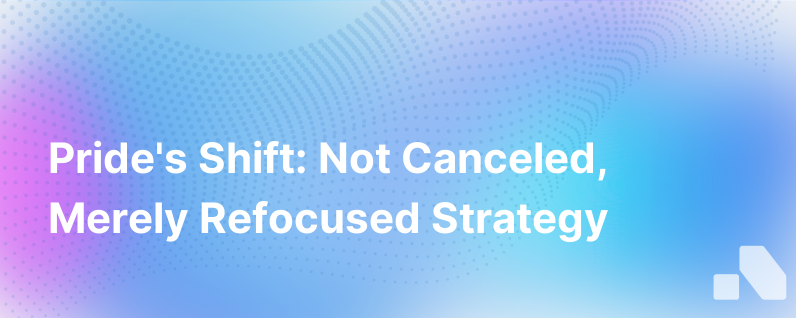
In a world where annual events and movements have been turned on their heads, there's a familiar refrain that has rippled across communities: "Pride is canceled." This statement, while rooted in the very real cancellations of parades and physical gatherings due to health and safety concerns, is both inaccurate and incomplete.
Pride is not simply a series of events, but a global affirmation of identity, equality and love. As such, the essence of Pride cannot be canceled—it is being refocused and reimagined, adapting to our rapidly changing world while remaining a powerful force for change.
There's something special about coming together as a vibrant community; being visible in our identities and solidarity is both a personal and political statement. June's Pride Month typically sees streets around the world lined with rainbow flags, buoyant parades, and demonstrative activism. This public celebration is not merely tradition but also a catalyst for advancement in rights and acknowledgment of past and ongoing struggles.
However, to say Pride is canceled is to ignore the expansive work community leaders and organizations are doing to adapt to the present circumstances. These unprecedented times have necessitated a shift in tactics, but the aims of visibility, solidarity, and activism remain the same. Recognizing this, let's explore how Pride is not canceled but rather refocused in its approach and expression.
Going Digital
The digital transformation of Pride is one of the most notable shifts. Virtual pride events, online discussions, and digital activism have taken the forefront. The significance of Pride has transcended physical spaces and now exists robustly in online communities where technology facilitates connection without the barrier of geography. These platforms are host to everything from drag performances and workshops to webinars and global summits on LGBTQ+ rights.
Emphasis on Intersectionality
Pride has also been a time to amplify voices often marginalized within the broader LGBTQ+ community, including people of color, trans individuals, and those with disabilities. This refocusing has been underscored by recent social justice movements which have intertwined with Pride, pushing the community to confront inequalities and demanding a more inclusive approach to advocacy and celebration. This engagement highlights not only LGBTQ+ issues but intersects with broader conversations about race, gender, and socio-economic disparities.
Localized Action and Advocacy
While Pride parades are grand, there is deep value in localized engagement and advocacy that can occur without a march. Individuals and organizations are seizing this moment to campaign for legal reforms, provide community support, and educate the public on a spectrum of issues affecting the LGBTQ+ community. In many ways, this refocused effort is more closely aligned with the origins of Pride—a protest and a fight for rights, rather than a parade.
Focusing on Health and Wellbeing
The health concerns that precipitated the shifts in Pride celebrations have also brought the community's health and wellness into sharper focus. It's a poignant reminder of the AIDS epidemic, which similarly had a profound impact on the LGBTQ+ community. Now, organizations are coupling their virtual Pride events with health and safety messaging, mental health resources, and support for those most vulnerable among us.
Engaging in Tough Conversations
Reimagining Pride has meant tougher conversations within the community are taking place. Aspects of Pride that had become commercialized or performative are being scrutinized. What used to be opportunities for brands to align themselves with the community through merchandise or parade participation is now an examination of those brands' year-round commitment to LGBTQ+ issues. The current focus is less on which businesses fly the rainbow flag and more on which are making concrete contributions to equality and representation.
Intimacy and Personal Reflection
In quieter spaces and smaller circles, Pride is taking on a more reflective tone. It's a time to understand personal journeys, share stories within close-knit groups, and educate oneself and one's family. This intimate nature of "homemade Pride" can often feel more profound than the largest of celebrations. It invites introspection, growth, and an appreciation for the strides already made.
Supporting LGBTQ+ Businesses
There is also a surge in supporting LGBTQ+ businesses affected by the economic downturn. Pride month has refocused on bolstering these businesses, as they are a vital part of the community. This economic solidarity is a practical way to uplift those who directly contribute to the wellbeing of LGBTQ+ people.
Conclusion
Yes, the streets may be quieter this June, and the glitter might settle untouched in jars, but the spirit of Pride pulses more energetically than ever. It's facile to suggest Pride is "canceled" because it's evolving, emerging stronger, more conscious, and determined than in years past. This refocusing is an opportunity not to miss the revelry but to deepen the commitment to what Pride really stands for—an unwavering dedication to dignity, equality, and the fight against discrimination in all forms.
Pride is more than parades and parties; it's a spirit uncontained by physical boundaries—a spirit that thrives on connection, advocacy, and the relentless pursuit of justice. So, uphold it loud and proud: Pride is not canceled; it's simply refocused, reaffirmed, and resilient. And in this refocused light, we find not the shadow of what was lost, but the illumination of what we can, and must, continue to achieve together.